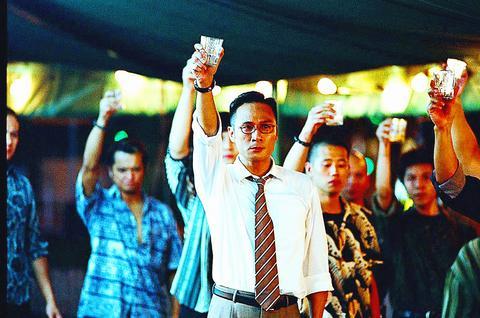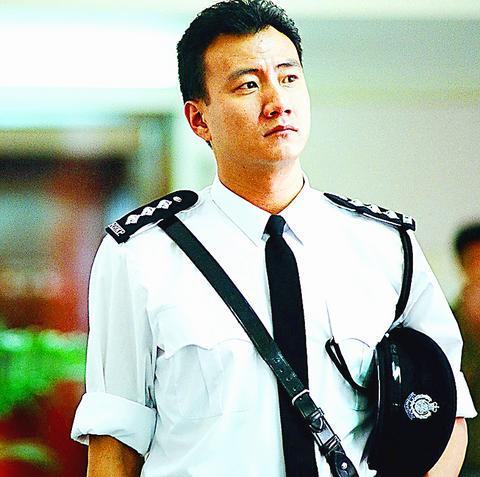Infernal Affairs (無間道), a slick cop-crime drama, was an unexpected success amid the slump in Hong Kong box-office receipts last year and aims to capitalize with an ambitious trilogy, the second part of which comes out today in Taiwan.
The sequel, Infernal Affairs II (無間道II), tells a bigger story and incorporates a bigger cast with a wider-ranging tale about the rise and fall of a Hong Kong triad family. This movie shows its makers have all the ambition to make an original epic of the series.

PHOTO COURTESY OF GROUP POWER
The testosterone-driven plot of the first Infernal Affairs is compounded this time around (it is actually a prequel in terms of the plot) by a charming character played by the dazzling Carina Lau (劉嘉玲).

PHOTO COURTESY OF GROUP POWER
In its attempt to become an epic it uses a similar narrative structure to The Godfather to describe an underworld feud among Hong Kong triads. Toward the end it even manages to incorporate the city's hand-over to China in 1997, as a means to add historical weight.
Sequels too often fall into the trap of becoming bloated versions of the first movie, with added action and drama, while being light on plot. In this respect Infernal Affairs II comes out looking good, having shown some restraint and not having degenerated into an empty slasher flick. It delivers a complete story, while tying in the original story and characters.

PHOTO COURTESY OF GROUP POWER
This prequel also maintains technical and stylistic excellence. The cinematography remains sharp and the editing smooth. Most importantly, it proves the fast pulse of Hong Kong-style action drama is still beating.
So, despite a few minor flaws, the prequel is a successful one, and should continue or even amplify the achievement of the Infernal Affairs trilogy.
In the new movie we're taken back to 1991, when Chen Wing-yan, played by Tony Leung (
Lau assassinates Ngai Kun, a Hong Kong triad leader, sparking a feud. Four gang leaders under Ngai prepare to rebel after his death. But the rebellion is immediately quelled by Ngai's second son Ngai Wing-hao, played by Francis Ng (吳鎮宇). He is well-educated, good mannered, cunning, cold and cruel, in a manner reminiscent of Michael Corleone in The Godfather.
The tyrant Sam Hung, played by Eric Tsang (曾志偉) in the first movie, is here a loyal subordinate, nine years before taking power. As already shown in the first movie, he sent Lau to study at the police academy to become his man on the inside. But what he did not know was that his woman Mary, played by Carina Lau, is the key figure behind the assassination of Ngai Kun.
Detective Wong, played by Anthony Wong (黃秋生), sent Chen undercover into the Ngai family, knowing that Chen is actually the half-brother of Ngai Wing-hao. "I want to be a good man," is how Chen explained to Wong his willingness to go undercover and arrest his half-brother if necessary.
All these reversed identities and character twists serves to show the ambiguity between good and evil and the obscure boundaries between friends and enemies that are the central themes in Infernal Affairs II.
The first movie shows the two lead actors both leading double lives undercover. In the prequel, the focus shifts to the antagonism between detective Wong and Sam Hung. That is, the acting contest between Andy Lau and Tony Leung this time moves to Anthony Wong and Eric Tsang.
Wong shows his dark side as he breaks the law and tries to instigate triad members to kill their bosses. Anthony Wong here excellently illustrates a complex and conflicted police officer, filled with guilt, frustration and cynicism, yet still holding out hope for justice being carried out in the end. However in this game between bad guys and good guys, he knows he will lose. The scheming Ngai ultimately begins his massacre four years later.
Infernal Affairs II spares us the massive gun battles seen in so many Hong Kong films. Instead, there are just cold-blooded murders in quiet lanes, market streets and outdoor eateries.
The movie recruited many of the top talents of the Hong Kong film industry, including director and cinematographer Andrew Lau (劉偉強), scriptwriter Alan Mak (麥兆輝), editors Danny and Oxide Pang (co-director of best-selling movie The Eye) and visual consultant Christopher Doyle. This concentration of talent should indicate that Hong Kong filmmakers have united to create an Infernal Affairs phenomena to signal a revival of the city's film industry.

“Why does Taiwan identity decline?”a group of researchers lead by University of Nevada political scientist Austin Wang (王宏恩) asked in a recent paper. After all, it is not difficult to explain the rise in Taiwanese identity after the early 1990s. But no model predicted its decline during the 2016-2018 period, they say. After testing various alternative explanations, Wang et al argue that the fall-off in Taiwanese identity during that period is related to voter hedging based on the performance of the Democratic Progressive Party (DPP). Since the DPP is perceived as the guardian of Taiwan identity, when it performs well,

The Taiwan People’s Party (TPP) on May 18 held a rally in Taichung to mark the anniversary of President William Lai’s (賴清德) inauguration on May 20. The title of the rally could be loosely translated to “May 18 recall fraudulent goods” (518退貨ㄌㄨㄚˋ!). Unlike in English, where the terms are the same, “recall” (退貨) in this context refers to product recalls due to damaged, defective or fraudulent merchandise, not the political recalls (罷免) currently dominating the headlines. I attended the rally to determine if the impression was correct that the TPP under party Chairman Huang Kuo-Chang (黃國昌) had little of a

At Computex 2025, Nvidia CEO Jensen Huang (黃仁勳) urged the government to subsidize AI. “All schools in Taiwan must integrate AI into their curricula,” he declared. A few months earlier, he said, “If I were a student today, I’d immediately start using tools like ChatGPT, Gemini Pro and Grok to learn, write and accelerate my thinking.” Huang sees the AI-bullet train leaving the station. And as one of its drivers, he’s worried about youth not getting on board — bad for their careers, and bad for his workforce. As a semiconductor supply-chain powerhouse and AI hub wannabe, Taiwan is seeing

Jade Mountain (玉山) — Taiwan’s highest peak — is the ultimate goal for those attempting a through-hike of the Mountains to Sea National Greenway (山海圳國家綠道), and that’s precisely where we’re headed in this final installment of a quartet of articles covering the Greenway. Picking up the trail at the Tsou tribal villages of Dabang and Tefuye, it’s worth stocking up on provisions before setting off, since — aside from the scant offerings available on the mountain’s Dongpu Lodge (東埔山莊) and Paiyun Lodge’s (排雲山莊) meal service — there’s nowhere to get food from here on out. TEFUYE HISTORIC TRAIL The journey recommences with